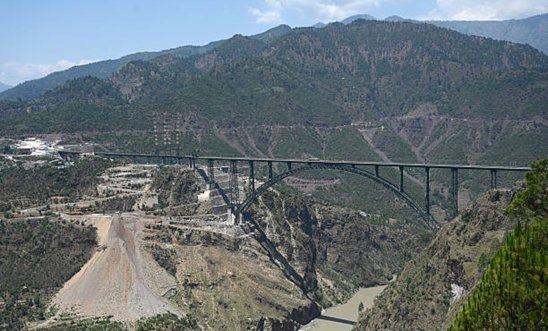
Progress and Development: But for whom?

Written by Cherry Bird, Country Coordinator for India
The Indian government is pouring money into Indian administered Kashmir, building major roads, state of the art bridges and rail links, which sounds benevolent, but who will benefit, and has anyone asked the local Kashmiris what they want? In such hilly and mountainous terrain these projects have significant environmental impacts, including destruction of forests and areas of natural beauty. They also have substantial impacts on the livelihoods of local people, further exacerbating the effects of increased “security” restrictions imposed following the deadly attack on a group of Indian tourists in the village of Pahalgam by militants in April 2025.
The Indian government will say that improved communication networks will improve the lives of Kashmiris, but in fact the focus is on benefits to major Indian corporations seeking to exploit natural resources and to open up more international trade routes. Indian pilgrims visiting newly constructed temples on sites that have little or no historic association with Hinduism will also have easier journeys.
Benefits for local farmers are not so obvious, but there are plenty of reasons for concern. Infrastructure developments require land, and farmers are given no choice and little or no compensation if a piece of their land is required for a new development. Given the fact that the average land holding of a Kashmiri farmer is only 1 acre, any reduction in size may make the farm unviable in terms of supporting a family. Most farmers grow a mix of crops such as vegetables, maize and apples, with a few animals that are grazed up in the mountains or forests in summer, often leased to a local shepherd who takes them up and stays with them.
Therin lies another problem for farmers; strict regulation of movement, which has further increased since Pahalgam, restricting their access to traditional forest and mountain grazing rights. All local people, including farmers and shepherds, must apply for permission to move around. The process is lengthy and complex, taking up time and resources, and permission may not be granted, or may be more limited than required. Even if permission is granted, unannounced night visits by security forces are common. In many cases the security personnel will take over the shepherd’s shelter leaving them to find an alternative or sleep outside.
These movement restrictions also affect the viability of a farm, as access to common-land grazing is an important facet of income. Life for local farmers with small land-holdings is hard enough without such restrictions or loss of land. In response, small-scale projects are being developed to help farmers understand the law and what they are entitled to.
Meanwhile tourism remains paralysed after Pahalgam, which means many people have lost their jobs, including hotel staff, guides, pony-men etc, and there is no support available for them. Following the attack, an estimated 2-3,000 people were rounded up and detained for days under the Public Safety Act, even if they had no connection at all with the attack. Indian Administered Kashmir is effectively a police state with almost complete control of people’s lives. Freedom of speech is non-existent, there is no right to freedom of assembly. Religious gatherings are often banned, even when permission has been applied for. No journalist can publish anything meaningful. Yet people are resilient and still find subtle ways to communicate their feelings and thoughts.
Our blogs are written by Amnesty International staff, volunteers and other interested individuals, to encourage debate around human rights issues. They do not necessarily represent the views of Amnesty International.
0 comments